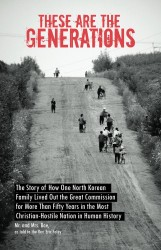 Second in a series of weekly posts by Mr. Bae, the co-author with Pastor Foley of These are the Generations, the story of third generation North Korean Christians. For Part I, click here. In today’s post, Mr. Bae details how release from prison marks the beginning of difficulties for persecuted Christians and their families, not the end.
Second in a series of weekly posts by Mr. Bae, the co-author with Pastor Foley of These are the Generations, the story of third generation North Korean Christians. For Part I, click here. In today’s post, Mr. Bae details how release from prison marks the beginning of difficulties for persecuted Christians and their families, not the end.
After being held in a North Korean prison without charge for more than a year, I was released in 2004.
From the moment I walked out of the prison and collapsed into the arms of my wife, the state security agents were always present, always watching through every window.
Because they went wherever I did, who could permit me to visit? What could I say to anyone about my experience? Who would want to show me any kindness?
Besides bringing secret agents wherever I went, I brought the diseases they had inflicted on me during my time in prison.
I could only walk with the greatest of difficulty, and even then only haltingly and for short distances.
My body was swollen and my muscles were clumsy. I could not sit in a chair due to hemorrhoids.
My family, which had been so prosperous before my imprisonment, had become the most destitute people in a land of destitute people.
My wife had had no choice but to spend everything we had to try to sustain our family while I was in jail and for the three years afterward when I could hardly move.
She herself had fallen into worse and worse health, and three surgeries failed to improve her condition.
Our children were forced to drop out of middle and high school because we had become social pariahs. My wife was reduced to trading trinkets in the street market just to enable us to survive.
Fortunately, as my basic body functions began to return over the next three years, people saw that we were choosing to not be involved in bad things, and so a few opportunities slowly began to open up for me.
After all, before I went to prison I had been a highly successful trader who earned a lot of foreign currency by selling ore to China. People knew I knew the business well, so one company decided to take a chance on me.
The work itself was not a problem, even without my health. But my new status as an ex-prisoner meant I was constantly hounded by calls and visits from police and government agents demanding bribes and kickbacks. They are always on the lookout for anyone making money, and ex-prisoners are easy targets.
I was in charge of running a whole mine, but I was making almost no money. I earned barely enough to put a little food on the family table now and then, and I had nowhere near enough to pay daily bribes.
It was then that I realized that for the rest of my life I would be chased from job to job, working harder than ever to make less money than before to pay bigger bribes just to avoid being dragged back to prison again.
Finally, with nothing left, we were forced to sell our home to pay for food.
Selling your home is illegal, of course—in North Korea your home is owned by the government; it doesn’t belong to you. Homes are sold in North Korea by desperate people all the time, but it is one more way the state can chase after you and demand more bribes.
So we had no choice but to become vagabonds, staying a week in one home and a week in another—we literally moved every week, taking whatever work we could do, buying whatever food we could afford, and then moving on again before the state could track us down.
I thought about black market trading—selling products from South Korea that are prohibited in North Korea. The penalties, however, are quite harsh. If they find your children selling the goods, they will take them away to do forced labor while you are punished even worse.
Because of my faith I decided I could not break the law. But in North Korea, the only way an ex-prisoner can live is to break the law. There is no other way—no human way, that is.
But something had happened to me in prison. Though my family and I lost everything—our health, our home, our reputation, our education, our money—we had received something greater:
Deep faith.
(To be continued next week…)










